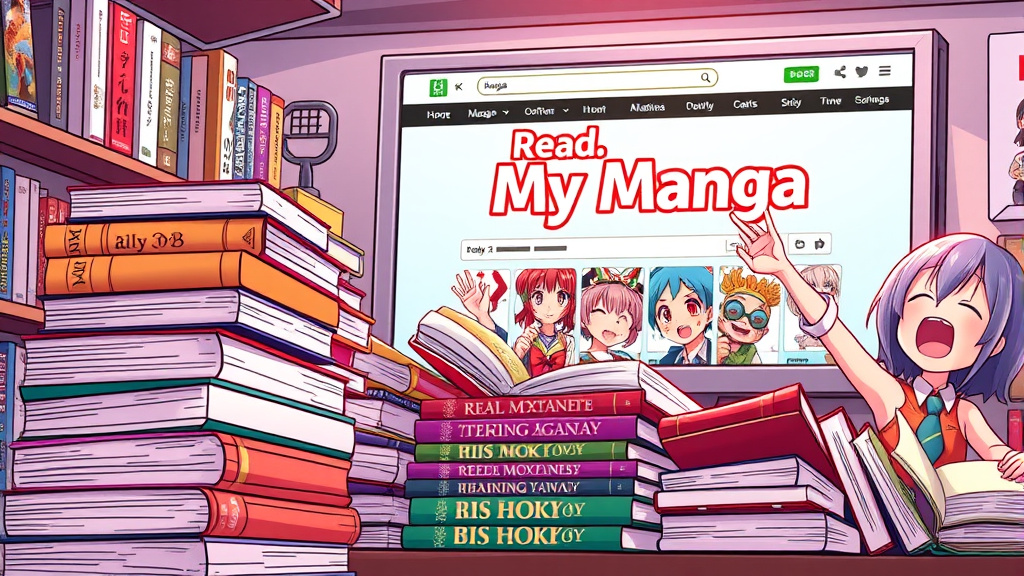The vibrant universe of japanese manga english has captivated millions worldwide, bridging cultural divides and transforming entertainment landscapes. As manga's crisp storytelling, compelling art, and unique characterizations transcend language barriers, they forge a powerful connection with international audiences. From humble beginnings as Japanese comic books, manga has emerged as a global phenomenon, influencing everything from fashion to animation, and even language itself. This article delves into the multifaceted realm of manga’s expansion into English-speaking countries, exploring its impact, the challenges faced in translation, and the exciting future that lies ahead.
The Growing Popularity of Japanese Manga in the English-Speaking World
The surge in japanese manga english readers over the last few decades reflects a remarkable cultural shift. Initially, manga was a niche interest, often limited to dedicated fans or expatriates familiar with Japanese language or culture. Today, it has become a mainstream entertainment source, with massive sales, dedicated conventions, and a thriving online community. This growth is driven by accessibility—thanks to digital distribution platforms, affordable print editions, and the ubiquity of streaming services adopting manga-based content.
Beyond mere consumption, manga’s popularity has inspired diverse creative adaptations, including anime, video games, and even fashion trends. Audience curiosity about Japanese social themes, philosophies, and societal norms through manga has fostered a deeper appreciation and understanding of Japanese culture. As more publishers recognize the potential of japanese manga english, they are investing in quality translations and diverse genres, from action and fantasy to romance and slice-of-life stories, ensuring that the appeal continues to diversify and deepen worldwide.
 Hình minh họa: japanese manga english – manga websites
Hình minh họa: japanese manga english – manga websitesTranslating the Nuances of Manga: Challenges and Solutions for English Editions
Translating manga from Japanese to English is a complex artistry, requiring more than literal translation. It involves capturing cultural nuances, humor, and emotional subtext—elements deeply rooted in language and context. For instance, puns, idioms, or expressions of politeness in Japanese often have no direct equivalents in English, posing a significant challenge. Translators must balance accuracy with readability, often making nuanced choices that impact how the story resonates with English-speaking audiences.
Innovative solutions such as localization teams employing cultural consultants have become standard to preserve manga’s original flavor. Moreover, the shift towards more dynamic translations that incorporate visual cues, slang, and tone helps to maintain the immersive experience. As the industry evolves, the importance of respectful, accurate translation becomes critical in ensuring that the japanese manga english editions honor the original work while making it accessible and engaging for newer generations of fans.

Exploring the Cultural Impact of Japanese Manga on English-Speaking Audiences
Manga’s influence on Western audiences extends far beyond entertainment—it fosters cultural exchange and mutual understanding. Through storytelling that often involves Japanese customs, history, and philosophies, readers develop an appreciation for Japan’s rich cultural tapestry. Popular manga series like Naruto or Attack on Titan introduce themes of perseverance, honor, and societal structure, prompting discussions about ethics and social dynamics among international fans.
Furthermore, manga has contributed to the popularization of Japanese language learning and cultural practices. Many fans incorporate japanese manga english into their daily lives, from learning basic phrases to adopting traditional fashion styles inspired by manga characters. This cross-cultural exchange cultivates a sense of global community rooted in shared interests and mutual respect, reinforcing the idea that stories told through manga serve as bridges to understanding a culture often perceived as distant or exotic.
From Page to Screen: The Influence of Manga on English-Language Animation and Film
Manga’s narrative techniques and aesthetic styles have dramatically shaped the landscape of English-language animation and film. Series like Fullmetal Alchemist or One Piece have inspired live-action adaptations and new animated productions that resonate with international audiences. Manga’s distinctive visual language—dynamic action sequences, expressive character designs, and cinematic pacing—translates seamlessly into manga-inspired animation, influencing Western studios’ creative processes.
The influence also extends to storytelling methods. The intricate plot twists, character-driven narratives, and thematic depth typical in manga have inspired Western filmmakers and animators to craft more complex, emotionally grounded stories. This cross-pollination has led to richer, more diverse content that echoes the japanese manga english aesthetic, blending Japanese storytelling philosophies with Western cinematic techniques—thus broadening the scope and appeal of international entertainment.
Japanese Manga vs. Western Comics: A Comparative Analysis for English Readers
While both manga and Western comics are visual storytelling mediums, their differences often lie in stylistic nuances, narrative structure, and cultural themes. Manga tends to feature right-to-left reading orientation, detailed backgrounds, and a focus on character development over episodic action. Western comics, however, often emphasize bold layouts, superhero archetypes, and serialized stories with a different pacing.
For English readers, understanding these distinctions enhances appreciation and allows them to navigate the genres with greater insight. Manga often explores complex themes such as identity and societal critique, while Western comics may lean more towards heroism and ethical dichotomies. Recognizing these cultural divergences deepens the appreciation of japanese manga english editions and enriches the reading experience by highlighting Japan’s unique narrative approach within the global comic landscape.
The Rise of Digital Manga: Accessibility and Distribution for English-Speaking Fans
Digital platforms like Crunchyroll, VIZ, and ComiXology have revolutionized access to japanese manga english, making it easier than ever for fans around the world to get their hands on recent releases or timeless classics. Subscriptions, pay-per-chapter models, and free previews democratize access, removing geographic and financial barriers that once limited manga distribution.
This increased accessibility has fostered a vibrant online community where fans share thoughts, theories, and fan art, fueling further engagement. Digital manga also allows publishers to adopt environmentally sustainable practices and respond quickly to market trends, releasing content in tandem with Japanese editions. As technology advances, the future of digital manga promises even more immersive experiences, such as augmented reality integration and interactive storytelling, ensuring that japanese manga english remains at the forefront of global entertainment innovation.
Copyright and Licensing: Navigating the World of English-Language Manga Publishing
The legal landscape surrounding manga publishing in English has historically been complex, marked by issues of copyright, licensing agreements, and piracy. Publishers face the challenge of securing rights from Japanese creators and studios, often requiring negotiation across different legal jurisdictions, which can delay or limit availability. Piracy, particularly through scanlations, has also impacted official sales, prompting publishers to develop stricter DRM measures and faster release schedules.
Despite these challenges, the industry continues to evolve with more transparent licensing agreements and global partnerships. The rise of official digital platforms helps combat piracy while ensuring creators receive proper compensation. For fans, understanding licensing issues underscores the importance of supporting legitimate sources, which helps sustain the vibrant ecosystem of japanese manga english offerings. As the market matures, legal and technological innovations will likely create a more secure environment for creators and fans alike.
Fan Translations and Scanlations: The Early Days of English Manga Consumption
Before the rise of official translations, fan communities played a pivotal role in disseminating manga through scanlations—unofficial, fan-made translations often shared freely online. These early efforts helped build a dedicated global community, igniting interest in manga and demonstrating its potential beyond Japanese borders. While technically a gray area legally, scanlations often gained popularity due to the speed and intimacy with which fans could access new content.
Today, fan translations remain a double-edged sword. They highlight the passion and demand for manga but often undermine official publishers' efforts and the rights of creators. Nonetheless, this grassroots movement fostered a culture of appreciation and advocacy, pushing publishers to accelerate their release schedules and improve localization quality. As the official market continues to grow, it’s undeniable that these early fan efforts played a role in shaping the demand and visibility for japanese manga english worldwide.
Manga's Influence on English Vocabulary and Cultural Expressions
The dissemination of manga has introduced many Japanese phrases, idioms, and cultural concepts into English vernacular. Words like kawaii (cute), senpai, and tsundere have entered everyday conversation, often with nuanced meanings derived from the manga they originate from. These terms serve as cultural touchstones, enriching the language and fostering cross-cultural dialogues.
Moreover, manga’s storytelling style and visual language influence how narratives are constructed in English media, from comics to advertising. It has inspired a new aesthetic and cultural lexicon rooted in Japanese pop culture, often termed Cool Japan. This phenomenon exemplifies how japanese manga english serves not merely as translation but as a conduit for Japanese cultural expressions influencing global communication and lifestyle trends.
The Future of Manga in English: Trends, Challenges, and Opportunities
Looking forward, the trajectory of japanese manga english suggests continued growth, driven by technological advancements such as augmented reality, AI-driven translation, and immersive digital experiences. Emerging genres like webtoons and interactive manga platforms offer new storytelling formats appealing to younger, tech-savvy audiences. Challenges remain in ensuring fair compensation for creators and navigating linguistic nuances that preserve original intent, but ongoing innovations in localization are promising.
The increasing acceptance and integration of manga into mainstream entertainment also open avenues for collaboration across media, including Hollywood adaptations, virtual reality experiences, and global merchandising. As the market becomes more sophisticated, there is immense opportunity for creators and publishers to expand reach, diversify content, and develop richer, more inclusive stories that resonate with a global audience. The future of japanese manga english promises to be dynamic, innovative, and culturally enriching.
Conclusion
The worldwide proliferation of japanese manga english represents more than just a translation success—it exemplifies a cultural exchange that enhances creativity, dialogue, and understanding across borders. The combination of technological advances, evolving industry practices, and a passionate international fanbase ensures manga's bright future in the English-speaking world. As manga continues to influence not only entertainment but also language and cultural expression, it remains a powerful conduit for sharing Japan’s rich stories and traditions with a global audience, creating lasting connections through the universal language of storytelling.





